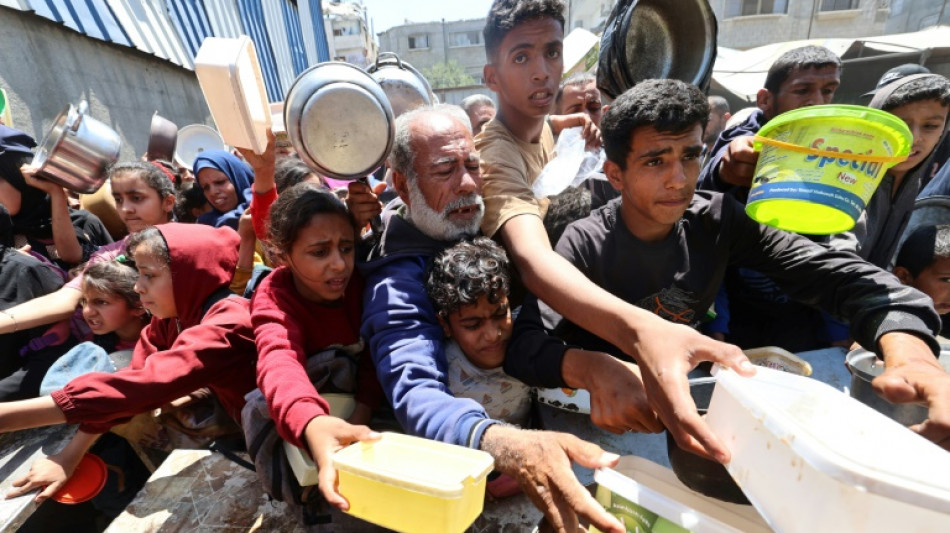

Israel cabinet approves plan for Gaza 'conquest'
Israel's security cabinet approved the expansion of military operations in Gaza including the "conquest" of the Palestinian territory, an official said Monday, after the army called up tens of thousands of reservists for the offensive.
It comes as the United Nations and aid organisations have repeatedly warned of the humanitarian catastrophe on the ground, with famine again looming after more than two months of a total Israeli blockade.
The plan, approved by the cabinet overnight, includes the holding of territories in the besieged Gaza Strip, the official said, and comes amid a push by Israel for Gaza's people to leave the territory.
Israel resumed major operations across Gaza on March 18 amid deadlock over how to proceed with a two-month ceasefire that had largely halted the war with Hamas, which was sparked by the militants' October 2023 attack.
Israel has since carried out intensive aerial bombardments and expanded ground operations across the Palestinian territory, with Gaza rescuers on Monday saying Israeli air strikes killed at least 19 people in the north.
The Israeli official said the plan for expanded operations "will include, among other things, the conquest of the Gaza Strip and the holding of the territories, moving the Gaza population south for their protection".
The majority of Gaza's population had resided in the north of the territory, particularly Gaza City, and nearly all have been displaced at least once since the war began.
The cabinet, which includes Prime Minister Benjamin Netanyahu and several ministers, "unanimously approved" the plan aimed at defeating Gaza's rulers Hamas and securing the return of hostages held in the territory.
The official source said the plan included "powerful strikes against Hamas", without specifying their nature.
- 'Sacrificing' hostages -
On Sunday, army chief Lieutenant General Eyal Zamir said the military was calling up "tens of thousands" of reservists to expand its offensive.
Israeli media reported that the plan would not be implemented before US President Donald Trump's visit to the region next week.
The health ministry in Hamas-run Gaza said Sunday that at least 2,436 people had been killed since Israel resumed its campaign on March 18, bringing the overall death toll from the war to 52,535.
Hamas's attack on October 7 resulted in the deaths of 1,218 people on the Israeli side, mostly civilians, according to an AFP tally based on official figures.
Militants also abducted 251 people, 58 of whom are still being held in Gaza, including 34 the Israeli military says are dead.
Israel says its renewed offensive is aimed at forcing Hamas to free its remaining captives, although critics charge that it puts them in mortal danger.
An Israeli campaign group representing hostages' relatives said the plan for an expanded Gaza offensive was "sacrificing" hostages held in the territory.
Alongside the cabinet-approved plan for the expansion of the war, Prime Minister Netanyahu "continues to promote" a proposal by US President Donald Trump for the voluntary departure of Gazans to neighbouring countries such as Jordan or Egypt, the official said.
Cairo and Amman, along with other Arab allies, governments around the world and the Palestinians themselves, have flatly rejected the proposal, but the notion has been seized on by Israeli ministers.
Israeli Defence Minister Israel Katz said in February that a special agency would be established for the "voluntary departure" of Gazans.
- 'Political blackmail' -
Israel's security cabinet also approved overnight the "possibility of humanitarian distribution, if necessary" in Gaza, "to prevent Hamas from taking control of the supplies and to destroy its governance capabilities".
The Axios news website on Friday reported that representatives from the United States, Israel and a new international humanitarian foundation were discussing a mechanism for resuming aid delivery to Gaza "without it being controlled by Hamas".
A grouping of UN entities and NGOs in the Palestinian territory accused Israel of seeking to "shut down the existing aid distribution system... and have us agree to deliver supplies through Israeli hubs under conditions set by the Israeli military".
The plan "contravenes fundamental humanitarian principles and appears designed to reinforce control over life-sustaining items as a pressure tactic –- as part of a military strategy", the Humanitarian Country Team of the Occupied Palestinian Territory said in a statement.
"The UN Secretary-General and the Emergency Relief Coordinator have made clear that we will not participate in any scheme", it added.
Hamas said Monday a new Israeli framework for aid delivery amounted to "political blackmail" and blamed Israel for the territory's "humanitarian catastrophe".
Israel's cabinet said there was "currently enough food" in Gaza, although humanitarian organisations and UN agencies have warned of the blockade's dire consequences for Gaza's 2.4 million people.
Crowds of desperate Gazans were seen piling up at a charity kitchen in the territory at the weekend, in photos published by AFP.
T.Ludwig--VZ


